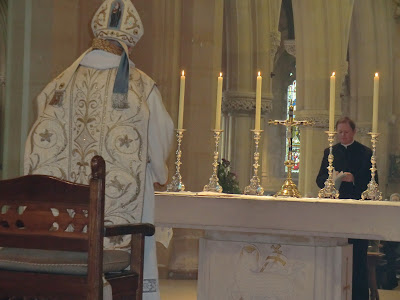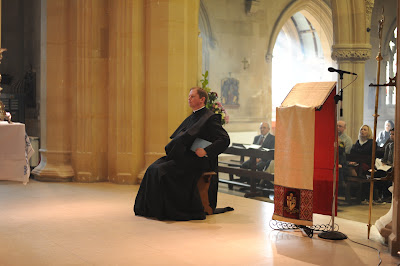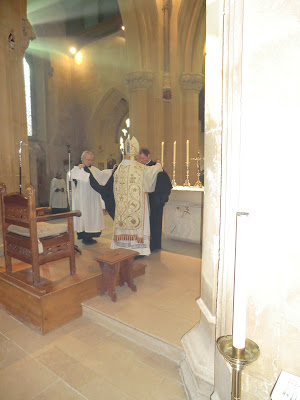Reading – St Paul to the Philippians 2:1-4
Dear Br David, you have just heard the words of St Paul writing to the Philippians. He always seems to put in a nutshell what is essential to Christian life and therefore to monastic life. In fact, as you know, much of the Rule based on his writings. Now you feel called to the monastic life and in a moment will ask formally to become a novice in this monastery. What is this life essentially but “life in Christ”, a life lived in love, a life lived in “the Spirit that we have in common”? It is a life that needs tenderness and sympathy, conviction and unity, ”a common purpose and a common mind”. It is a life where there can be no place for competition and conceit. We have to be self-effacing, considering others to be better than ourselves, and always putting their interests first.
You have studied the Rule and you practice Lectio Divina every day. You know perfectly well that what you read and study must be put into practice, and that is not easy. When you were in the world you could pick and chose your friends and the company you kept, and, to some extent, you were independent. In the monastery it is God who calls the shots, he who choses those you are to live with and hold everything in common with. It is a pity we use the words monastic and Benedictine to the exclusion of coenobitic, because if you cannot live the common life, life in community, life in Christ who is a community of persons, the Mystical Body, then you will never make a real monk or a true Benedictine. It was Dom Columba Stewart, in an excellent retreat, who said, “Love them or hate them, you’ve got to live with them.” That living with them will always involve both love and hate, yet we know that there can be no room for hate in the heart of a Christian, who has been called by Christ to forgive over and over and over again. I think it is true to say that as we go through life as coenobites we grow to love the community and we grow to love even those individuals we found difficult and unlikable at the start.
The Rule and its faithful observance has as its goal the eradication of the passions and one of the strongest and most destructive of these is anger. This can manifest itself in many ways, as I know from my own experience. But I also know that if I put myself entirely in God’s hands and allow him to work his miracle of healing in me, then even the wildest of passions can be calmed and transformed into a force for good. Hence the importance of patience and perseverance, two key words in the Rule and the two virtues, that together with discretion, make up the basis for living the coenobitic life. In Chapter 72 on the good zeal monks should have, after quoting Romans 12:10 on showing respect to each other, St Benedict says that this can only be done by “supporting one another’s weaknesses of body and behaviour with the greatest patience, and earnestly competing in obedience to one another.” Now patience, as we all know, comes from the Latin word “to suffer”, not in the sense of just putting up with the brethren but of actually suffering on account of them, for them, with them and on their behalf. This is not easy at first, nor is it ever going to be easy, but with God’s help everything is possible and nothing impossible.
Hence the vital importance of prayer and following not just the set times for community prayer (from which we should never be absent except for a legitimate reason) and personal prayer, but, like the Lord Jesus himself, making time for prayer at night and whenever you can be alone with God. Dear David, develop the art of continuous prayer, so that you can be praying and focussed on God even when you are working, doing other things or just resting. Prayer will see you through the most difficult moments of your life as a monk. It is the secret to a life lived in peace, in joy and in union with Christ and your brethren. I ask you to pray for me and for all your brethren and I assure you that we will always pray for you and for your fulfilment and happiness among us. Amen
Clothings take place after 1st Vespers of today's feast.
Br Huw sings his profession, vows of Stability, Conversio Morum, and Obedience
Dear Br David, you have just heard the words of St Paul writing to the Philippians. He always seems to put in a nutshell what is essential to Christian life and therefore to monastic life. In fact, as you know, much of the Rule based on his writings. Now you feel called to the monastic life and in a moment will ask formally to become a novice in this monastery. What is this life essentially but “life in Christ”, a life lived in love, a life lived in “the Spirit that we have in common”? It is a life that needs tenderness and sympathy, conviction and unity, ”a common purpose and a common mind”. It is a life where there can be no place for competition and conceit. We have to be self-effacing, considering others to be better than ourselves, and always putting their interests first.
You have studied the Rule and you practice Lectio Divina every day. You know perfectly well that what you read and study must be put into practice, and that is not easy. When you were in the world you could pick and chose your friends and the company you kept, and, to some extent, you were independent. In the monastery it is God who calls the shots, he who choses those you are to live with and hold everything in common with. It is a pity we use the words monastic and Benedictine to the exclusion of coenobitic, because if you cannot live the common life, life in community, life in Christ who is a community of persons, the Mystical Body, then you will never make a real monk or a true Benedictine. It was Dom Columba Stewart, in an excellent retreat, who said, “Love them or hate them, you’ve got to live with them.” That living with them will always involve both love and hate, yet we know that there can be no room for hate in the heart of a Christian, who has been called by Christ to forgive over and over and over again. I think it is true to say that as we go through life as coenobites we grow to love the community and we grow to love even those individuals we found difficult and unlikable at the start.
The Rule and its faithful observance has as its goal the eradication of the passions and one of the strongest and most destructive of these is anger. This can manifest itself in many ways, as I know from my own experience. But I also know that if I put myself entirely in God’s hands and allow him to work his miracle of healing in me, then even the wildest of passions can be calmed and transformed into a force for good. Hence the importance of patience and perseverance, two key words in the Rule and the two virtues, that together with discretion, make up the basis for living the coenobitic life. In Chapter 72 on the good zeal monks should have, after quoting Romans 12:10 on showing respect to each other, St Benedict says that this can only be done by “supporting one another’s weaknesses of body and behaviour with the greatest patience, and earnestly competing in obedience to one another.” Now patience, as we all know, comes from the Latin word “to suffer”, not in the sense of just putting up with the brethren but of actually suffering on account of them, for them, with them and on their behalf. This is not easy at first, nor is it ever going to be easy, but with God’s help everything is possible and nothing impossible.
Hence the vital importance of prayer and following not just the set times for community prayer (from which we should never be absent except for a legitimate reason) and personal prayer, but, like the Lord Jesus himself, making time for prayer at night and whenever you can be alone with God. Dear David, develop the art of continuous prayer, so that you can be praying and focussed on God even when you are working, doing other things or just resting. Prayer will see you through the most difficult moments of your life as a monk. It is the secret to a life lived in peace, in joy and in union with Christ and your brethren. I ask you to pray for me and for all your brethren and I assure you that we will always pray for you and for your fulfilment and happiness among us. Amen
Clothings take place after 1st Vespers of today's feast.
THE FEAST OF THE MEETING OF THE LORD: THE PRESENTATION Feb.2nd
from Great Vespers of today's feast:
The Ancient of Days, who in times past gave Moses the Law on Sinai, appears this day as a babe. As Maker of the Law He fulfills the Law, and according to the Law He is brought into the temple and given over to the Elder, Simeon the righteous receives Him, and beholding the fulfillment of the divine ordinance now brought to pass, rejoicing he cries aloud: "My eyes have seen the mystery hidden from the ages, made manifest in these latter days, the Light that disperses the dark folly of the Gentiles without faith and the Glory of the newly-chosen Israel. Therefore let your servant depart from the bonds of this flesh to the life filled with wonder that knows neither age nor end, O You who grants the world great mercy.
Today He who once gave the Law to Moses on Mount Sinai submits Himself to the ordinances of the Law, in His compassion becoming for our sakes as we are. Now the God of purity as a holy child has opened a pure womb, and as God He is brought as an offering to Himself, setting us free from the curse of the Law and granting light to our souls.Him whom the ministers at the liturgy on high entreat with trembling, Simeon has now received below in his earthly arms, and he proclaims the union of the Godhead with mankind. Seeing the heavenly God as mortal man, he makes ready to withdraw from earthly things, and raises his cry in joy, "Glory to You, O Lord, who has revealed to those in darkness the Light that knows no evening."Today Simeon takes in his arms the Lord of Glory whom Moses saw of old in the darkness, when on Mount Sinai he received the tablets of the Law. This is He who speaks through the prophets; He is the Creator of the Law. This is He whom David announced; He is fearful to all, yet has great and abundant mercy.Today Simeon the Elder enters the temple rejoicing in spirit, to receive in his arms Him who gave the Law to Moses and who Himself fulfills the Law. For Moses as counted worthy to see God through darkness and sounds not clear; and with his face covered he rebuked the unbelieving hearts of the Hebrews. But Simeon carried the pre-eternal Word of the Father in bodily form, and he revealed the Light of the Gentiles, the Cross and the Resurrection; and Anna was proved to be a prophetess, preaching the Savior and Deliverer of Israel.
THE BLESSING OF CANDLES AND TEMPORARY PROFESSION OF BR HUW LLEWELYN EDWARDS
Fr Abbot in the sacristy
community and faithful in the cloister
the beginning of the Blessing
the abbot blessing the candles with holy water
THE PROFESSION
ABBOT PAUL'S HOMILY
Dear Br Huw, what a wonderful feast on which to make your First Profession! Although in the Western Church it has always been known as the Feast of the Purification of Our Lady and, in recent times, the Presentation of Our Lord in the Temple, in the Eastern Churches, and it is an Eastern feast adopted by the Western Church, it is known by another name altogether: the Feast of Meeting or Encounter, in Greek “Upapanté”, for it celebrates the meeting of Simeon and Anna in the Temple with the Infant Jesus who is accompanied by his mother Mary and her husband Joseph.
When Mary and Joseph come to fulfill the traditional rite of purification and presentation, something strange and unexpected happens. Simeon, described by Luke simply as “an upright and devout man” on whom “the Holy Spirit rests”, is prompted by the Spirit to come into the Temple. Taking the child in his arms, he blesses God and says, “My eyes have seen the salvation which you have prepared for all the nations to see, a light to enlighten the gentiles and the glory of your people Israel.” In other words, Simeon recognises the infant Jesus, now cradled in his arms, to be the Messiah promised to Israel by the prophets long ago, God made man, Emmanuel. Yet joy is tinged with pain, because this Messiah will save his people by dying on a Cross and shedding his blood to forgive their sins and reconcile them, Jew and Gentile alike, with each other and with the Father. The child will become a sign of contradiction and a sword will pierce his mother’s heart.
The story does not finish there. Anna, an old prophetess who haunts the Temple, as old women often do, comes by at that very moment and begins praising God and speaking of the child as the future liberator of Jerusalem. What a day that must have been for Mary and Joseph, but what did they make of it all? The truth is that we do not know. What we do know is what Simeon and Anna made of it, for they fearlessly bear witness that this child and no other is Christ the Saviour. In the infant Jesus, the Christ child, they encounter the Source of life, they see the Light of the world and they experience the presence of God. Unlike the shepherds, to whom choirs of angels announced the Saviour’s birth, and unlike the Magi, whom a star guided to the manger, this time there are no heavenly visions, no angel voices, just the Child himself and the inspiration of the Holy Spirit.
And this, Br Huw, is where you come into the story, because the monastic life is an encounter with Christ in prayer; the coenobitic life is a living with Christ in community; the Benedictine life is a meeting with Christ following the inspired guidance of Rule of St Benedict. The Temple where this meeting takes place is not only this abbey church, but the entire monastery and each one of your brethren. Above all it is your heart and the offering of your life to God. In prayer and work, in study and contemplation, in patience and perseverance, in discretion and fraternal charity, in your contemporaries and your seniors, in the sick and the dying, through the inspiration of the Holy Spirit, you encounter God in Christ who loves you and reveals himself to you.
But there’s also another way of looking at this encounter. As a baptised Christian you have been reborn in the image of Christ. St Benedict insists that we should learn to see Christ in one another and in each other love and serve him. Today you are the baby Jesus and we, the monastic community, Simeon and Anna. Your coming among us brings new life and fresh hope to those of us who are advanced in years. You are the future of this community as we were many years’ ago. On the other hand, we could say that we are Mary and Joseph, your parents in the monastic life, and that today we are presenting you to God, consecrating you to his service and imploring his blessing upon you.
Whatever way we look at this lovely feast, which links the Nativity to the Passion of Our Lord, Christmas to Easter, and so celebrates the mystery of the Incarnation in all its fullness, today you are making your First Profession and with it you offer yourself as a sacrifice of love to God. We witness and accept that offering in his name and pray for your eventual perseverance in a lifelong commitment to God and to his Church as a monk of Belmont. May the good Lord accept your offering, may Our Lady nurture and protect you and may your brethren, the monks of this community, as well as your family and friends, encourage and support you always.
Br Huw receives the cowl of a professed monk from the Abbot
THE MONASTIC VOCATION
Listen to the excellent interview with the Romanian Orthodox hermit in the first video and the interview with the Carmelite nun from Bethlehem in the second. Compare them with what the Abbot said to the new novice and new professed yesterday and today. You will discover that, whatever the monastic observance, the ecclesiastical allegiance, the colour of the habit, the geography and external circumstances, the monastic quest and ideal are one.
BEYOND SILENCE: CARTHUSIANS SPEAK (CATHOLIC) (CLICK TITLE)
LIFE IN VALAAM MONASTERY (ORTHODOX) (CLICK TITLE)




















No comments:
Post a Comment